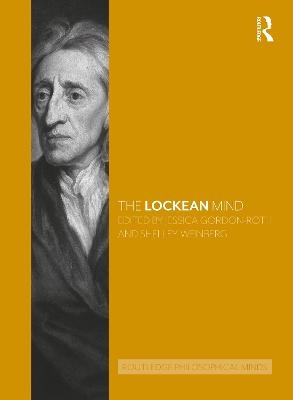
The Lockean Mind
Routledge (Verlag)
978-1-138-29690-9 (ISBN)
John Locke (1632–1704) is considered one of the most important philosophers of the modern era and the first of what are often called ‘the Great British Empiricists.’ His major work, An Essay Concerning Human Understanding, was the single most widely read academic text in Britain for fifty years after its publication and set new limits to the scope and certainty of what we can claim to know about ourselves and the natural world. The Declaration of Independence and the United States Constitution were both highly influenced by Locke’s libertarian philosophical ideas, and Locke continues to have an impact on political thought, both conservative and liberal. It is less commonly known that Locke was a practicing physician, an influential interpreter of the Bible, and a policy maker in the English Carolina colonies.
The Lockean Mind provides a comprehensive survey of Locke’s work, not only placing it in its historical context but also exploring its contemporary significance. Comprising almost sixty chapters by a superb team of international contributors, the volume is divided into twelve parts covering the full range of Locke’s thought:
Historical Background
Locke’s Interlocutors
Locke’s Epistemology
Locke’s Philosophy of Mind
Locke on Philosophy of Language and Logic
Locke’s Metaphysics
Locke’s Natural Philosophy
Locke’s Moral Philosophy
Locke on Education
Locke’s Political Philosophy
Locke’s Social Philosophy
Locke on Religion
Essential reading for students and researchers in philosophy, Locke’s work is central to epistemology; metaphysics; philosophy of mind; philosophy of language; natural philosophy; ethical, legal-political, and social philosophy; as well as philosophy of education and philosophy of religion. This volume will also be a valuable resource to those in related humanities and social sciences disciplines with an interest in John Locke.
Jessica Gordon-Roth is McKnight Land Grant Professor and Associate Professor of Philosophy at the University of Minnesota, Twin Cities, USA, and Resident Fellow of the Minnesota Center for Philosophy of Science. Shelley Weinberg is Associate Professor of Philosophy at the University of Illinois at Urbana-Champaign, USA. Her book Consciousness in Locke (2016) received the Journal of the History of Philosophy’s 2017 book prize.
General Introduction Jessica Gordon-Roth and Shelley Weinberg Part 1: Historical Background 1. Life and Works J.R. Milton Part 2: Locke’s Interlocutors Introduction Jessica Gordon-Roth and Shelley Weinberg 2. Locke and William Molyneux Ruth Boeker 3. Locke and Damaris Cudworth Masham Jacqueline Broad 4. Locke and Catharine Trotter Cockburn Patricia Sheridan 5. Locke and Edward Stillingfleet Michael Ayers 6. Locke and Anthony Collins Larry Jorgensen 7. Locke and Jonas Proast Victor Nuovo 8. Locke and Philippus van Limborch Julie Walsh Part 3: Locke’s Epistemology Introduction Jessica Gordon-Roth and Shelley Weinberg 9. Locke Against the Nativist Margaret Atherton 10. Locke on Knowledge and Certainty Jennifer Smalligan Marušić 11. Locke on Knowledge and Opinion Matthew Priselac 12. Locke on Knowledge of the External World Anna Vaughn 13. Locke on Cognitive Bias: Of the Conduct of the Understanding and diseases of the mind Tom Stoneham and Elisabeth Thorson Part 4: Locke’s Philosophy of Mind Introduction Jessica Gordon-Roth and Shelley Weinberg 14. Locke on Representation and the Nature and Central Role of Ideas Martin Lenz 15. Locke on Sense Perception Walter Ott 16. Locke on Consciousness and Reflection Shelley Weinberg 17. Locke on Memory Vili Lähteenmäki 18. Locke on Superaddition and the Possibility of Thinking Matter Victor Nuovo 19. Locke and Projects for Naturalizing the Mind in the 18th Century Charles Wolfe Part 5: Locke on Philosophy of Language and Logic Introduction Jessica Gordon-Roth and Shelley Weinberg 20. Locke on Origins, Nature, and Functions of Language Benjamin Hill 21. Locke on the Uses and Abuses of Language Lewis Powell 22. Locke and Sergeant on Syllogistic Reasoning Patrick J. Connolly Part 6: Locke’s Metaphysics Introduction Jessica Gordon-Roth and Shelley Weinberg 23. Locke on Space and Duration Annemarie Butler 24. Locke on Power and Freedom Julie Walsh 25. Locke on Substance Han-Kyul Kim 26. Locke on Individuation and Identity Han Thomas Adriaenssen 27. Locke on Persons and Personal Identity David Wörner 28. Locke and the Current Debate on Personal Identity Marya Schechtman Part 7: Locke’s Natural Philosophy Introduction Jessica Gordon-Roth and Shelley Weinberg 29. Locke on Physiology and Medicine J. C. Walmsley 30. Locke on Scientific Methodology Huaping Lu-Adler 31. Locke and Corpuscularianism Jan-Erik Jones 32. Locke on Causation and the Laws of Nature Geoffrey Gorham 33. Locke on Essences Allison Kuklok 34. Locke on Primary and Secondary Qualities Tyler Hanck 35. Locke, Newton, and Edmund Law Emily Thomas Part 8: Locke’s Moral Philosophy Introduction Jessica Gordon-Roth and Shelley Weinberg 36. Locke’s Metaethics Aaron Garrett 37. Locke on Knowledge of Morality Elliot Rossiter 38. Locke’s Moral Psychology Ruth Boeker 39. Locke on Moral Agency and Moral Agents Antonia LoLordo Part 9: Locke on Education Introduction Jessica Gordon-Roth and Shelley Weinberg 40. Locke on Habituation and the Association of Ideas Kathryn Tabb 41. Locke on Intellectual and Moral Virtue Shelley Weinberg 42. Locke and Rousseau on Educating For Freedom Hina Nazar Part 10: Locke’s Political Philosophy Introduction Jessica Gordon-Roth and Shelley Weinberg 43. Locke on the State of Nature S.-J. Savonius-Wroth 44. Locke on Property Helga Varden 45. Locke on Consent Richard Vernon 46. Locke and Executive Power Mark Goldie 47. Locke on Toleration: Rejecting the Sovereign Remedy Douglas Casson 48. Locke’s Republican and Liberal Legacy Daniel Layman Part 11: Locke’s Social Philosophy Introduction Jessica Gordon-Roth and Shelley Weinberg 49. Locke on Money Justin C. Clark 50. Locke on Slavery Charles W. Mills 51. Locke on Marriage Susanne Sreedhar 52. Locke on Children’s Rights Alexandra Oprea 53. Locke on Midwifery and Childbirth: A Glimpse of a Sexist Epistemology? Jessica Gordon-Roth Part 12: Locke on Religion Introduction Jessica Gordon-Roth and Shelley Weinberg 54. Locke on Our Idea and Knowledge of God Samuel C. Rickless 55. Locke on Reason, Revelation, and Miracles Nathan Rockwood 56. Locke on Enthusiasm Robert Pasnau and Mark Boespflug 57. Locke on Biblical Method and Theological Interpretation Kim Ian Parker 58. Locke on Resurrection and the Afterlife Nicholas Jolley 59. Locke and Contemporary Philosophy of Religion Kristen Irwin. Index
| Erscheinungsdatum | 01.09.2021 |
|---|---|
| Reihe/Serie | Routledge Philosophical Minds |
| Zusatzinfo | 2 Line drawings, black and white; 2 Illustrations, black and white |
| Verlagsort | London |
| Sprache | englisch |
| Maße | 174 x 246 mm |
| Gewicht | 1280 g |
| Themenwelt | Geisteswissenschaften ► Philosophie |
| Geisteswissenschaften ► Religion / Theologie | |
| Sozialwissenschaften ► Pädagogik | |
| Sozialwissenschaften ► Politik / Verwaltung ► Politische Systeme | |
| Sozialwissenschaften ► Politik / Verwaltung ► Politische Theorie | |
| ISBN-10 | 1-138-29690-2 / 1138296902 |
| ISBN-13 | 978-1-138-29690-9 / 9781138296909 |
| Zustand | Neuware |
| Haben Sie eine Frage zum Produkt? |
aus dem Bereich


